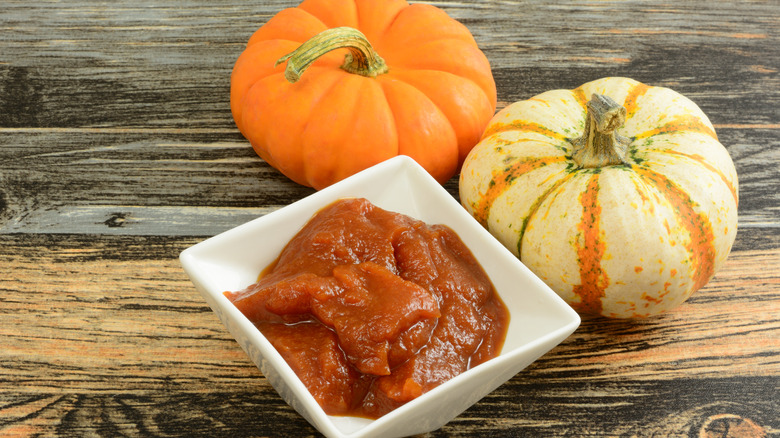The Reason Pumpkin Butter Should Never Be Canned At Home
Pumpkin butter, a delightful blend of fall spices and sweetened pumpkin purée, is enjoyed by many people, either by eating it directly from a spoon or spreading it on top of warm, crusty bread. This velvety spread holds an esteemed place in many of our culinary hearts, tempting us with its lush flavor and homey appeal.
However, despite its innocent façade, the home canning of pumpkin butter poses a surprising risk — one that's strong enough for food safety experts to advise against the DIY practice.
In essence, the risk is not with the pumpkin butter itself but with the process of home canning. Home canning of pumpkin butter can potentially lead to the growth of Clostridium botulinum, a bacterium that produces a toxin that can cauuse botulism, a serious form of food poisoning. It's a startling revelation that adds a somewhat bitter undertone to the sweet pumpkin delicacy.
Why is pumpkin butter so dangerous for home canning?
You may wonder what makes pumpkin butter more susceptible to bacterial growth than other foods. It all comes down to pumpkins' intrinsic characteristics.
Like other gourds, pumpkins are low in acid. They have a pH range of 6 to 6.8, which indicates low acid levels. For food to be safe for home canning, they must have a pH level of 4.6 or below. Pumpkins' low acidity means they provide an ideal breeding ground for harmful bacteria, such as Clostridium botulinum, especially in the oxygen-free environment that canning creates. These bacteria produce heat-resistant spores that can withstand typical home-canning temperatures, making it difficult to ensure complete safety.
Pumpkin butter's density and consistency compound this issue. It's hard to guarantee uniform heat penetration during home canning for a dense substance like this, which means bacteria could potentially survive, even in the cooking process.
Safer alternatives for home canning
While the risks tied with canning pumpkin butter at home are high, this danger does not extend to all fruit and vegetable preserves. Indeed, there are several safer alternatives that can satisfy your home canning aspirations. Apple butter and plum butter, for instance, make delightful homemade preserves. Both fall within the safe acidity range for home canning and pose significantly lower risks than pumpkin. Their naturally higher acidity levels, combined with the sugar added in the recipes, help to inhibit the growth of harmful bacteria, making them safe for water bath canning at home.
On the contrary, other low-acid spreads, such as squash or zucchini butter, pose similar risks to pumpkin butter and are best avoided for home canning. They require professional-grade equipment and expert knowledge for safe preservation.
Home canning can be an immensely satisfying activity that allows you to preserve and enjoy the bounty of the season. But it's essential to keep safety at the forefront of your preservation practices. Always follow trusted recipes and methods, and when considering canning any other fruit or vegetable butter, make sure to research its safety and suitability for home preservation.


